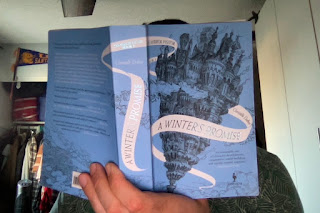Lucas Blogs About A Winter's Promise
 |
| It really is a lovely shade of blue. |
So, what's this book's deal?
You're the worst, Lucas.
Yep! Last Winter I was the worst at finishing books that weren't comics. That said, I read so many comics that I've lost track of what order I read them in, so I've probably already blogged about several that I actually read after I gave up on Magic and A Winter's Promise. So that's something. Anyway, time to get this one out of the way. Unlike Magic, I don't feel bad about giving up on A Winter's Promise, but before we get into why, let's give a brief synopsis of what I got through.
Let's.
Okay. So Ophelia is the curator of a museum in a place called Anima where she uses her ability to see the history of the objects she touches to . . . . see the history of the objects she touches.
Well that would be useful for a museum curator.
Yes it is. She can also travel between mirrors, and still suffers a physical ailment from the time she got stuck as a child. However, her family really wants her to get married. And when a community keeps track of kinship relationships like they do in Anima, that basically means the entire community, especially the doyennes, really want Ophelia to get married. But she just wants to tend to her museum. However, since she's put off getting married for so long, the doyennes force her hand by arranging a political marriage between Ophelia and the taciturn Thorn, a gangling giant of a man from the far north who she initially takes for a hunter but actually turns out to have a desk job at the Treasury. Anyway, Ophelia accompanies her new fiancé back to his home where he seems intent on keeping her prisoner (ostensibly to protect her from his political rivals), but she soon finds a way to sneak out (you know, using mirrors), and that's about where I gave up. This was about a third of the way through the book.
So, not a huge chunk.
No. But it took me like a month to get that far. I just couldn't get into the book. And that's mostly down to Ophelia. Ophelia is a passive protagonist, which can work. For example, I quite enjoyed The Goblin Emperor by Katherine Addison. The titular emperor in that novel begins as a passive protagonist and eventually begins to master the skills needed to control his own destiny. On the other hand, Ophelia isn't just passive, but she's kind of a wet blanket.
Do you think a male blogger complaining about a female protagonist in a forced marriage being a "wet blanket" is a good look?
No. It's not. As with Magic, it felt like Dabos (and/or translator Hildegarde Serle) and I could never get on the same wavelength. The novel is in the third person, and maybe having Ophelia narrate her own story might have helped me connect with her. But it's clearly not the direction that Dabos was going, so it's hard to say. The writing itself isn't bad, and it does seem like quite a bit of thought was put into world building, but between my reading funk and the fact that I didn't really care about the protagonist I struggled to find a reason to keep going with this one.
So you gave up?
So I gave up. But that's not to say that the novel is entirely without value. It isn't badly written. And Dabos does a good job with building up the world.
Yeah, you haven't talked much about that.
I have not. It seems like most of the world is uninhabitable by humans, who mostly live in places called Arks. On Anima, for example, the entire society claims descent from Artemis, a godlike figure who definitely still exists and spends most of her time in an observatory. It turns out that Thorn wasn't just sent to Anima to fetch a bride, but to give something to Artemis from the head honcho back at Thorn's Ark (which I can't remember the name of).
The Ark or the head honcho?
Yes. Anyway, Dabos actually does a good job of slipping in bits of exposition about that without stopping the action (such as it is) for big exposition dumps. Again I just didn't feel drawn in by the characters. That said, this is more of a YA thing, so I'm also not the target audience. So, you know, feel free to disregard any and all of the opinions expressed in this blog if any of this sounds interesting to you. Oh, and before I forget, this is the first book in a series called The Mirror Visitor.
A Winter's Promise by Christelle Dabos (trans. Hildegarde Serle), Europa Editions trade paperback edition, 2020 (originally published in French as La Passe-Miroir. Livre 1. Les fiancés de l'hiver in 2013), 491 pages, pairs well with stress-eaten lunches in the break room at work where you think about reading it and then pull out your phone instead
Links:
Here's a profile of the author on the publisher's website, if you're into that kinda thing.
Comments
Post a Comment